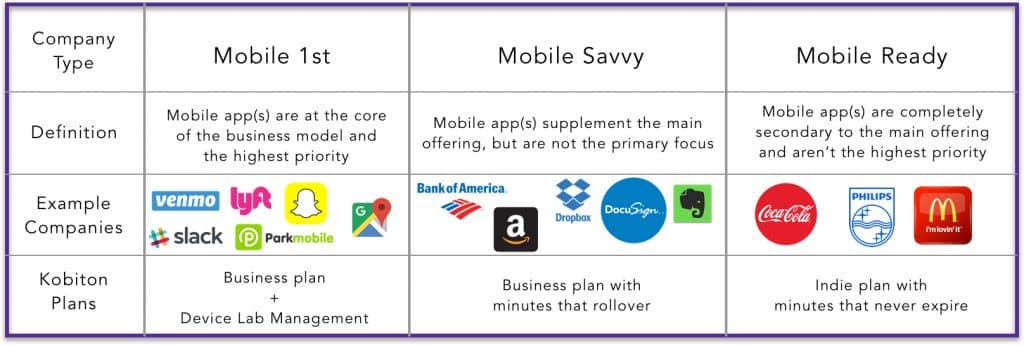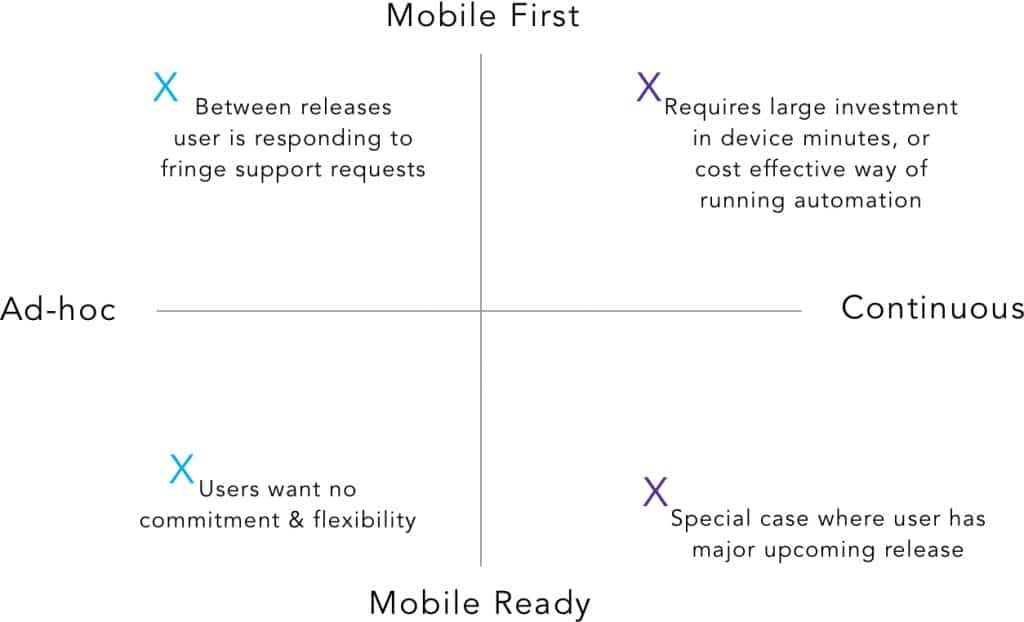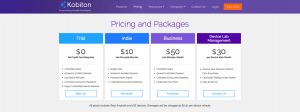
Is AI Going to Take My Job?

Adam Creamer
If you develop iOS and Android apps for a wide range of customers, chances are you will need mobile testing at some point. While there are plenty of free mobile testing tools out there, including Android emulators and iPhone simulators, when searching for a model that best fits your company’s unique and growing needs, I recommend researching the benefits of testing on mobile devices you own versus using an established mobile device cloud.
One of the great things about Kobiton’s newest pricing update is that it considers the various requirements and mobile testing models employed by a wide range of users, and thus, has something to fit everyone’s needs.
The answer lies in knowing what type of company you are and what your mobile testing cadence will be. That said, let’s dive into some details about the best options for selecting a mobile device cloud based on your current operation.
When talking about mobile app development, all companies – no matter their size, tend to fall into one of three categories: Mobile 1st, Mobile Savvy, or Mobile Ready. Although today’s consumers have come to expect high quality experiences from all mobile players, the manner in which your organization prioritizes testing apps on real devices may rise and fall depending on which bucket you fall into.

Once you have defined which mobile category best fits your company, you can better determine the most appropriate testing cadence for ensuring consistent app quality.
Now we should consider how often your organization will actually need to test during your build/release cycles. Unlike choosing which mobile category you fit into, defining your company’s optimal testing pattern may not be as black and white, and could require a trial and error approach. That being said, most companies fall somewhat cleanly into one of three mobile testing intervals: ad-hoc, frequent, or continuous.

Without relying on historical data, and to avoid wasting too many resources, the easiest way to determine which testing pattern you’ll likely fall into would be to cross-reference your mobile category (how you prioritize testing) with your company size (how many testers are on your team) to get an idea of how much investment you should be putting into QA.

The good news is that Kobiton has an array of features and plan options that allow for significant flexibility during the evaluation process. Let’s look at some of the aspects of Kobiton that will aid in your ability to find the best approach for your business.
After listening to user feedback and learning from our customers, we changed our pricing options and added new features that increase our platform’s flexibility to better meet the needs of any company from the scenarios above.
Within each of these plans, users can customize the amount of minutes needed from month to month, adding or subtracting volume at any time. Additionally, we’ve provided users the option to purchase Device Lab Management, a feature exclusive to our Business plan, that lets distributed teams in multiple locations access the same internal test devices from one centralized, easy to manage cloud portal.
Below is a breakdown of how the new Kobiton changes benefit companies regardless of where they fit on the spectrum of mobile testing priority and cadence.
This plan works best for small startups with one QA person or individual developers looking for a better alternative to cheap or free mobile testing tools like iOS simulators and Android emulators. We’ve also seen teams use our new pay-as-you-go Indie model as a risk-free way to continue a POC after their trial period has ended. The biggest draw to our Indie option is that it gives teams with inconsistent testing patterns an easy way to keep tabs on pesky bugs that result from incremental product changes between build cycles without the commitment of a monthly subscription. And the best part? Your minutes never expire.
You can start testing apps on real devices with our Indie plan today for as low as $10 and add minutes when you need them at only $0.10 per.
Our Business plan is primarily for QA teams consisting of teams of testers with more than 3 people. With this option, customers are given unlimited user seats, unlimited concurrent test sessions, and can also begin to consider the benefits of owning and testing on internal devices (more on that later). The biggest draw for Business subscribers is that, unlike many of our competitors, Kobiton customers have the flexibility to dynamically adjust minute volume from one month to the next. This means you won’t be locked into a contract with 3,000 device minutes per month for 6 months if after the first month of testing you discover that you only need 1,500. And for the months when you have more testing time than you can use? We offer free rollover so businesses like yours can keep your minutes for when you need them.
Teams can jump into our Business plan today for as low as $50/month for 500 minutes with the ability to add/subtract minutes throughout the month as needed and unused minutes that rollover in perpetuity.
Only available to Business subscribers, Device Lab Management is a more effective way to manage internal devices and increase productivity of your QA team. We talk to customers every day and hear how they are constantly evaluating the choice between effectively investing in an internal device lab and external testing options. With our new pricing structure, Business customers don’t have to choose. They can purchase a Business plan for a base rate of $50/month for 500 minutes of testing time, or get more from their internal devices for just $30/device slot/month for a single internally connected device, or both. Our plans are meant to be customizable to better meet the needs of our users and help them be more productive.
Device Lab Management is ideal for organizations with distributed teams who need a way to remotely access and manage testing on mobile devices via a shared cloud. For companies attempting to accommodate testers by duplicating devices across multiple locations, this option reduces hardware, decreases wasted time, and inversely, increases savings and efficiency.
We’ve also seen teams who need to run automated testing at scale take advantage of our Device Lab Management feature, as it provides a cost-effective method for executing 24/7 continuous runs at no additional cost. Simply put, you can deploy automated testing on your own devices for an infinite amount of time without being charged by the minute.
You can begin using Device Lab Management for only $30/device slot per month. For more information about the benefits of DLM, contact us and we’ll help you find the solution that works best for you.

Now that you’re equipped with all the information, it’s up to you to make the choice that best fits your business needs. Every company’s situation varies based on its product, offering, and mission, but in listening to our customers, we have learned a few things.
That said, it’s best to take advantage of any and all free trials to run simultaneous POCs and figure out which providers work best with your testing/development environment. Although there are a few well-qualified companies to serve your mobile testing needs, choosing Kobiton will give you the best flexibility for tailoring your testing to the nature of your business while remaining cost effective.